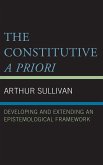Drawing on twentieth-century philosophy of science and language, this book identifies three requirements for widespread factual agreement: a pervasive habit of checking assumptions, densely connected communities, and projects that straddle those communities. When communities are insulated from each other, belief segregation follows.
Bitte wählen Sie Ihr Anliegen aus.
Rechnungen
Retourenschein anfordern
Bestellstatus
Storno









